2024届高考英语二轮复习代词复习课件 (共108张PPT)
文档属性
| 名称 | 2024届高考英语二轮复习代词复习课件 (共108张PPT) | 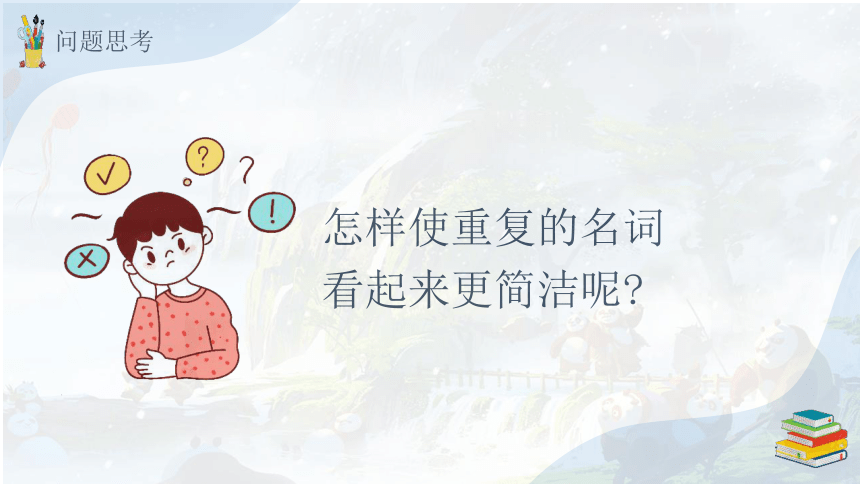 | |
| 格式 | pptx | ||
| 文件大小 | 35.9MB | ||
| 资源类型 | 教案 | ||
| 版本资源 | 通用版 | ||
| 科目 | 英语 | ||
| 更新时间 | 2024-03-09 20:52:06 | ||
图片预览

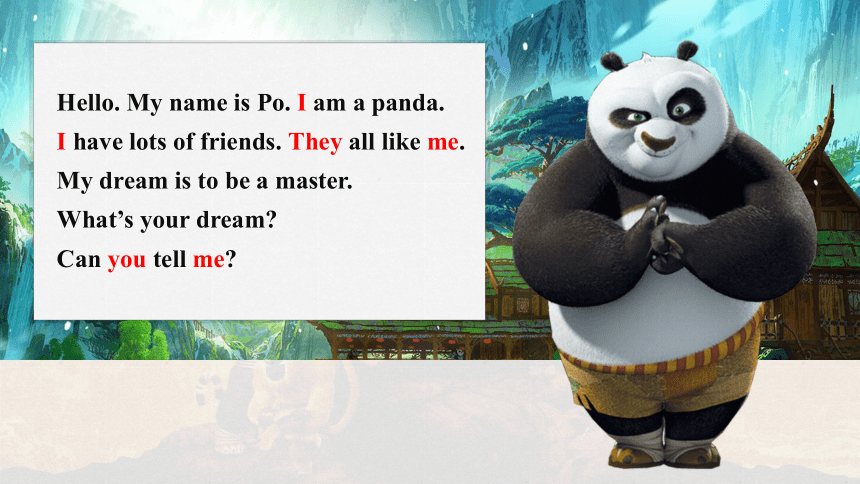
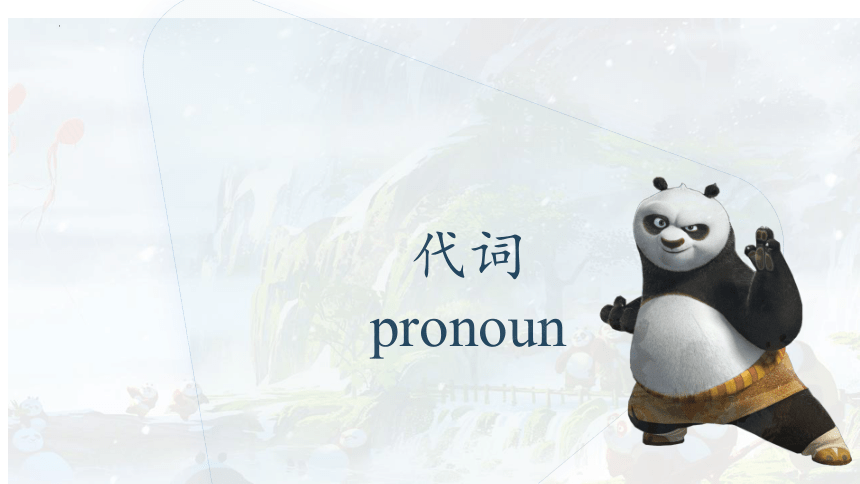
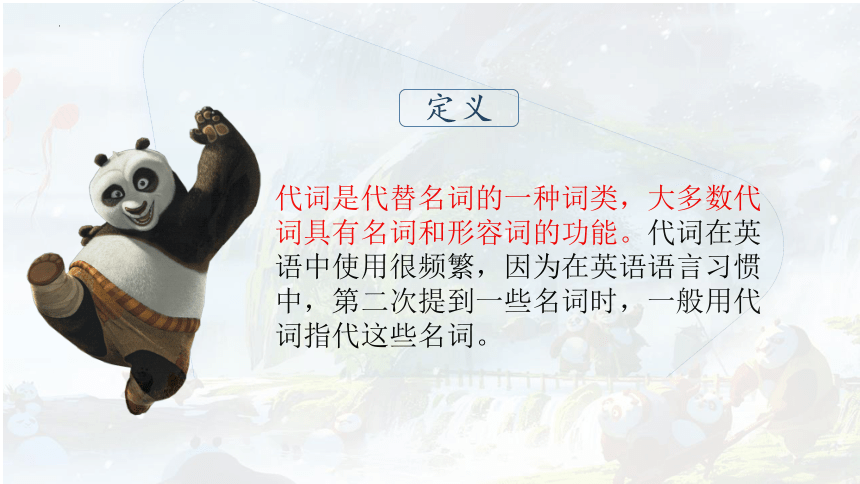
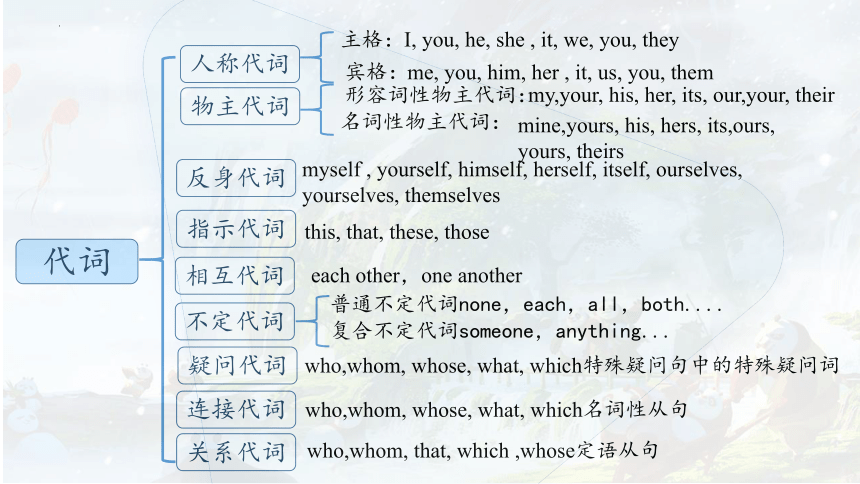
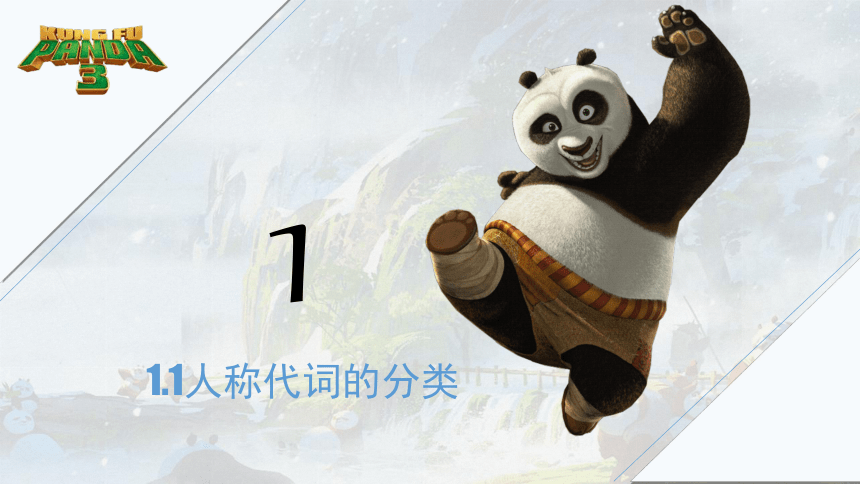
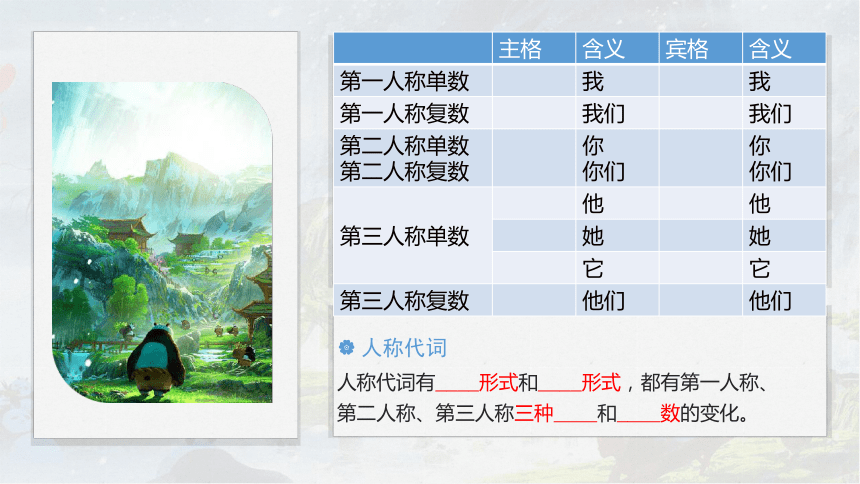
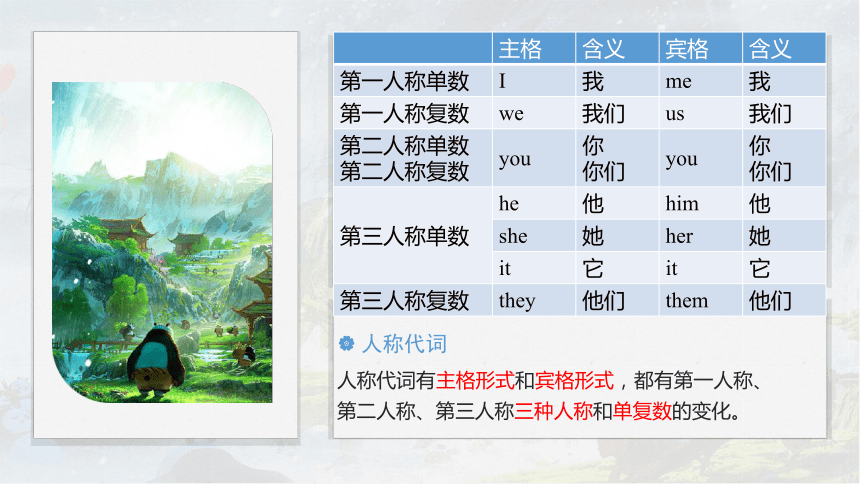
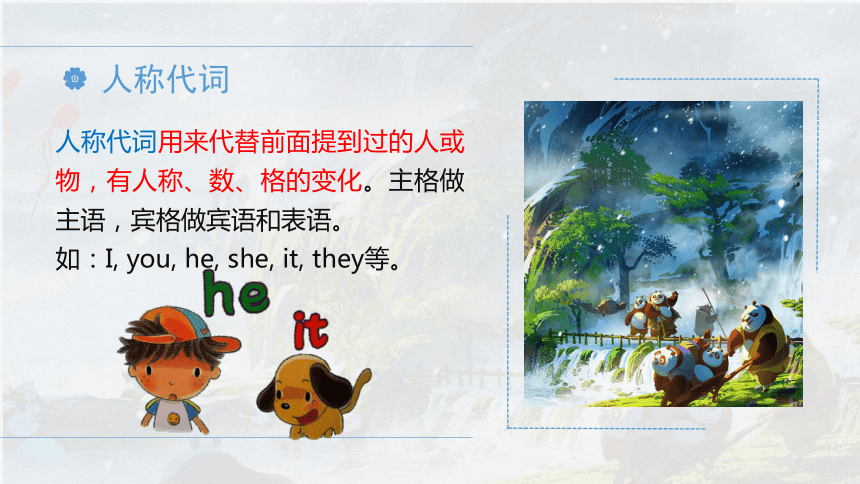
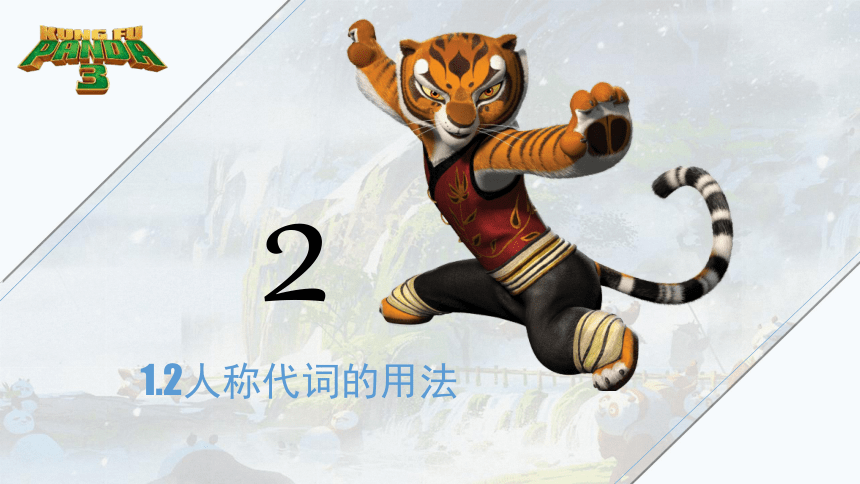
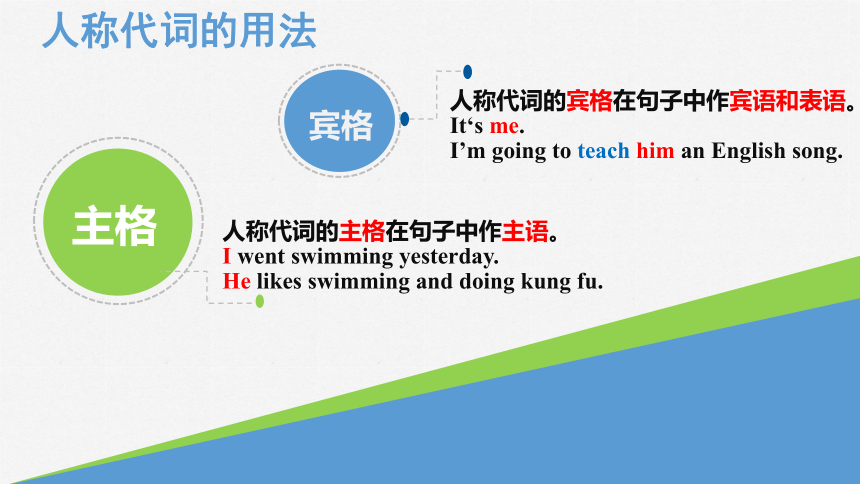
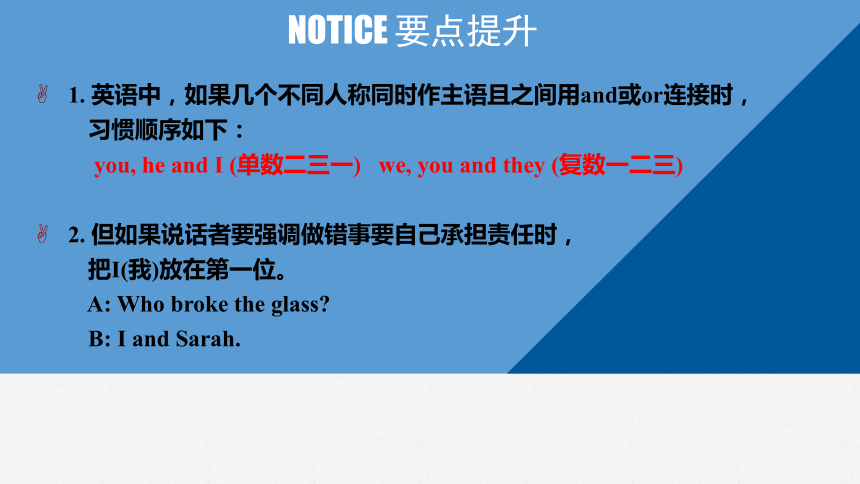
文档简介
(共108张PPT)
问题思考
怎样使重复的名词
看起来更简洁呢
Hello. My name is Po. I am a panda.
I have lots of friends. They all like me.
My dream is to be a master.
What’s your dream
Can you tell me
代词pronoun
代词是代替名词的一种词类,大多数代词具有名词和形容词的功能。代词在英语中使用很频繁,因为在英语语言习惯中,第二次提到一些名词时,一般用代词指代这些名词。
定义
代词
人称代词
物主代词
反身代词
不定代词
疑问代词
关系代词
主格:
宾格:
形容词性物主代词:
名词性物主代词:
myself , yourself, himself, herself, itself, ourselves, yourselves, themselves
I, you, he, she , it, we, you, they
me, you, him, her , it, us, you, them
my,your, his, her, its, our,your, their
mine,yours, his, hers, its,ours,
yours, theirs
this, that, these, those
指示代词
who,whom, whose, what, which特殊疑问句中的特殊疑问词
who,whom, that, which ,whose定语从句
普通不定代词none,each,all,both....
复合不定代词someone,anything...
相互代词
each other,one another
连接代词
who,whom, whose, what, which名词性从句
1.1人称代词的分类
1
人称代词有____形式和____形式,都有第一人称、第二人称、第三人称三种____和____数的变化。
人称代词
主格 含义 宾格 含义
第一人称单数 我 我
第一人称复数 我们 我们
第二人称单数 第二人称复数 你 你们 你
你们
第三人称单数 他 他
她 她
它 它
第三人称复数 他们 他们
人称代词有主格形式和宾格形式,都有第一人称、第二人称、第三人称三种人称和单复数的变化。
人称代词
主格 含义 宾格 含义
第一人称单数 I 我 me 我
第一人称复数 we 我们 us 我们
第二人称单数 第二人称复数 you 你 你们 you 你
你们
第三人称单数 he 他 him 他
she 她 her 她
it 它 it 它
第三人称复数 they 他们 them 他们
人称代词用来代替前面提到过的人或物,有人称、数、格的变化。主格做主语,宾格做宾语和表语。
如:I, you, he, she, it, they等。
人称代词
1.2人称代词的用法
2
宾格
主格
人称代词的用法
人称代词的主格在句子中作主语。
I went swimming yesterday.
He likes swimming and doing kung fu.
人称代词的宾格在句子中作宾语和表语。
It‘s me.
I’m going to teach him an English song.
NOTICE 要点提升
1. 英语中,如果几个不同人称同时作主语且之间用and或or连接时,
习惯顺序如下:
you, he and I (单数二三一) we, you and they (复数一二三)
2. 但如果说话者要强调做错事要自己承担责任时,
把I(我)放在第一位。
A: Who broke the glass
B: I and Sarah.
1
3
代替前面提到过的事物。
Where is my dog
It is eating behind the door.
2
it 的用法
表示婴儿、动物或不明身份、不确定的人。
Who is it
It’s me.
表示时间、天气、距离、价值、气候及温度等。
It is very cold outside.
It’s 2:30 p.m.
4
it 的用法
it作形式主语和形式宾语,代替to do短语,v-ing短语或主语从句,宾语从句。
It is a waste of time playing games.
It is a pity that he didn’t come.
It is important to undertand it.
I would appreciate it if you can consider me.
(1)it作形式主语的常用句型:
①It+be+adj./n.+(for/of sb.)+to do sth.对于某人来说做某事......
②It is no good/no use/useless doing sth.做某事无用
③It's (well) worth doing sth...值得做某事
④It+be+名词词组+that从句
⑤It+不及物动词+that从句
⑥It+be+过去分词+that从句
⑦It takes sb.+时间 to do sth.做某事花费某人多少时间
It is a pity/shame that...真可惜……
It is no wonder that... ……不足为奇,难怪
It seems/appears that...似乎/看来……
It happens that...碰巧……
It occurs to/comes to/strikes/hits sb. that...某人突然想起……
It is said/reported that… 据说/据报道.....
It is certain that… 肯定.....
It is well-known that... 众所周知.....
It is fun doing sth. 做某事有趣
(2)it作形式宾语的常用句型:
①主语+think/believe/suppose/consider/feel/make/...+it+adj./n.+(for/of sb.)+to do sth./that从句;
②主语+think/believe/suppose/consider/feel/make+it+useless/worth/no use/no good/a waste of time/money/energy/...+doing sth.
5.含有it的常考短语和句型:
believe it or not 信不信由你
make it 成功;做到
take it for granted that... 认为……是理所当然的
as someone puts it 像某人所说的那样
when it comes to... 当涉及/谈到……
owe it to sb.that... 把……归功于某人
keep it in mind that... 把……铭记在心
It depends. 视情况而定。
Take it easy. 别着急。
It's (high) time that sb. did/(should) do sth.
是某人该做某事的时候了。
It's the 序数词time that sb. have/has done sth.
是某人第几次做某事。
It has been/is+时间段+since从句 自从……多久了
It will be/was+时间段+before从句 要过多久才……
It is/was+时间点+when... 当……时候,时间是……
强调句型:It is/was+被强调部分+that/who+其它
人称代词 基础训练
Exercise
2
一、选择人称代词的主格形式填空。(I you he she it we they)
1. a girl _______ 2. a pencil _______
3. Emma and I _______ 4. you and your mother _______
5. four dogs _______ 6. Jack _______
7. Linda _______ 8. a dog _______
9. my father ________ 10. Jean and Tony _______
she
we
they
she
he
it
you
he
it
they
人称代词 基础训练
Exercise
二、选择正确的人称代词填空 。
1. Don't ask________any questions.(she, her)
2. He speaks English to________.(we, us)
3. It's too dark. I can't see________.(he, him)
4. ________ have two brothers.(I, me)
her
us
him
I
人称代词 基础训练
Exercise
二、选择正确的人称代词填空。
5. ________want to see a movie tomorrow.(them, they)
6. Do________ cook on Sundays (they, them)
7. What are ________ doing now (you, your)
8. Can you give ________ a pen (I, me)
They
they
you
me
人称代词 基础训练
Exercise
三、单选。
( ) 1. _____ are all good students in school.
A. You, I and she B. I, she and you
C. You, she and I D. She, you and I
( ) 2. -Who broke the vase -_____.
A. I and Amy B. Amy and I
C. me and Amy D. Amy and me
C
A
人称代词 基础训练
Exercise
( ) 3. Where did you go -_____
A. I went to the park. B. We go the park.
C. They went to Sanya. D. We see a film.
( ) 4. Did you go to Turpan -_____.
A Yes, I did. B. No, I don’t.
C. Yes, we do D. Yes, we didn’t.
A
A
人称代词 基础训练
Exercise
四、填空。
5. ________ ( he ) is a student.
6. Give it to _________. ( she )
7. Show _________ your kite, OK (they)
8. Where are _________ I can't find _________. ( they )
He
her
them
they
them
2.1 物主代词的分类
2
物主代词是___________的代词。
包括_____________和_____________。
物主代词
形代 名代 含义
第一人称单数 我的
第一人称复数 我们的
第二人称单数 第二人称复数 你的
你们的
第三人称单数 他的
她的
它的
第三人称复数 他们的
物主代词是表示所属关系的代词。
包括形容词性物主代词和名词性物主代词。
物主代词
形代 名代 含义
第一人称单数 my mine 我的
第一人称复数 our ours 我们的
第二人称单数 第二人称复数 your yours 你的
你们的
第三人称单数 his his 他的
her hers 她的
its its 它的
第三人称复数 their theirs 他们的
物主代词用于表示所属关系,也可叫代词所有格,可以分为形容词性物主代词(在句中作定语)和名词性物主代词(在句中作主语,宾语和表语)。
如:my, yours, his, her, its, theirs等。
物主代词
2.2物主代词的用法
2
名代
形代
物主代词的用法
形容词性物主代词
相当于形容词,作定语,放在名词前。
Close your eyes, please.
My name is Po.
名词性物主代词
相当于名词,名代=形代+名词。
其后不能再跟名词。做主宾表。
The cat is hers. This is her cat.
Mine is red. I like hers.
物主代词口诀:
有名则形,无名则名。
物主代词 基础训练
Exercise
一、写出正确的词。
1. These are _____books. (our\ours)
2. What is _____favourite food (yours\your)
3. This is _____coat. (my\mine)
4. My hair is red. _____is yellow.( Hers\Her)
our
your
my
Hers
物主代词 基础训练
Exercise
二、用正确的形容词性物主代词填空。
1. This is ______ car. (he)
2. Excuse me, Rose. Is this ______ umbrella (you)
3. I am an actor. ______ name is Jackie Chan. (mine)
4. Mary’s coat is here, too. That is ______ coat. (I)
his
your
My
my
物主代词 基础训练
Exercise
三、用正确的形容词性物主代词填空。
5. Look at the dog. ______ tail is brown.(it)
6. We listen with ______ ears.(we)
7. Mom, where are ______ keys I can’t find them.(you)
8. Zhang Peng can help Peter and John with ______ Chinese.(they)
Its
our
your
their
物主代词 拔高训练
Exercise
四、单选。
( ) 1. This is my book. _____are over there.
A. Your B. Yours C. You D. Mine
( ) 2. Whose pen is it It's_____.
A. her B. hers C. she D. he
( ) 3. _____bag is new and_____ is new, too.
A. Our, he B. Ours, his C. My, his D. My, her
B
B
C
物主代词 拔高训练
Exercise
四、单选。
( ) 4. This room is ours, and that one is _____.
A. they B. them C. theirs D. their
( ) 5. Whose pencils are there They're _____.
A. my B. me C. mine D. our
( ) 6. Is the new watch_____ Yes, it's_____.
A. you, me B. yours, mine C. your, my D. your, mine
C
C
B
物主代词 拔高训练
Exercise
四、单选。
( ) 7. She is a student. _____name is Han Mei.
A. Its B. Her C. Hers D. His
( ) 8. It's a dog. I don't know _____name.
A. its' B. its C. it D. it's
B
B
3.1 反身代词的分类
3
反身代词是表示___________的代词。
有_____________和_____________的变化。
物主代词
反身代词 含义
第一人称单数 我自己
第一人称复数 我们自己
第二人称单数 你自己
第二人称复数 你们自己
第三人称单数 他自己
她自己
它自己
第三人称复数 他们自己
反身代词是表示某人自己的代词。
有人称和数的变化。
物主代词
名代 含义
第一人称单数 myself 我自己
第一人称复数 ourselves 我们自己
第二人称单数 yourself 你自己
第二人称复数 yourselves 你们自己
第三人称单数 himself 他自己
herself 她自己
itself 它自己
第三人称复数 themselves 他们自己
反身代词:表示“我自己,你自己,她/他/它自己,我们自己,你们自己,他们自己”的代词,有人称和数的变化。在句中可作宾语,表语和同位语。
如:myself,themselves等。
反身代词
3.2反身代词的用法
3
◆反身代词的用法
成分 位置 例句
作宾语 动词或介词 之后 Last night,Tom and Cindy enjoyed themselves at the party.昨晚,汤姆和辛迪在聚会上玩得很开心。
作表语 系动词之后 The poor boy in the story was myself.这个故事中的贫穷男孩就是我自己。
作同位语 名词或代词之后或句末 I myself did it.=I did it myself.我自己做的它。
注意:反身代词不能单独作主语。
拓展:反身代词固定搭配
come to oneself 苏醒
say to oneself 心里想;自言自语
make oneself at home 别拘束
can not help oneself 情不自禁
动词
behave oneself 举止得体
adapt/adjust oneself to 适应于
abandon oneself to 沉迷于;放纵于
express oneself 表达自己的思想
lose oneself in 迷失
talk to oneself 自言自语
feel oneself 觉得身体正常
devote oneself to 致力于
apply oneself to 专心致志于
seat oneself 坐下
1.We enjoyed (we) at the party last Sunday.
2.Let Tony do it by (he).He is no longer a kid.
3.You are twelve now. (you) must look after ( you).
4.Teachers have no choice but to take action to protect ( they).
5.The girl thanked me for my paper and gave me a bag of cookies she made .(she)
ourselves
himself
yourselves/yourself
themselves
herself
You
用适当的反身代词填空。
1. The students of Class Two enjoyed _________ very much in the World Park.
2. Mary, don’t always think of ________.
3. At the weekend, I ______ often cook meals.
4. When she was in the middle school, she began to teach ______ English.
5. He fell off the bike and hurt ______ yesterday when he went home.
themselves
yourself
myself
himself
herself
6. In autumn, the leaves on the trees dropped off __________.
7. Can she do it ______ or does she need help
8. Please help _________ to some apples and make _________ at home, children.
9. They wanted to keep their secrets to __________, but they were wrong. We all know about it.
10. The little cat can’t catch the mice by _____.
themselves
herself
yourselves
yourselves
themselves
itself
它自己
11.When she woke up a day later, she found _________ in hospital.
12. Daniel put the photos on his home page. Go and see for ___________, my dear friends.
13. Can Nick carry this box by _________
14. Mary is old enough to take care of _________.
15.That’s all right. Goodbye, Kate. Enjoy _________!
16. We always enjoy __________, Mum.
herself
yourselves
himself
herself
yourself
ourselves
类别 人称代词 物主代词 反身代词
主格 宾格 形容词性 名词性
功能 主语 宾语、表语 定语 主语、表语、宾语 宾语、表语、同位语
第一人称 单数 I我 me我 my我的 mine我的 myself我自己
复数 we我们 us我们 our我们的 ours我们的 ourselves我们自己
第二人称 单数 you你,你们 you你,你们 your你的,你们的 your你的,你们的 yours你的,你们的 yourself你自己
复数 yourselves你们自己
第三人称 单数 he他 him他 his他的 his他的 himself他自己
she她 her她 her她的 hers她的 herself她自己
it它 it它 its它的 its它的 itself它自己
复数 they他们 them他们 their他们的 theirs他们的 themselves他们自己
链接高考
1. (全国甲卷) Only a few choose to deal with the problems on our own. Their answers also show that they dislike talking to others. They keep very much to themselves.
2. (全国乙卷) Ecotourism has _______(it) origin with the environmental movement of the 1970s. It was not widely accepted as a travel concept...
3. (新高考I卷) As the song goes, this long and winding road “will never disappear”, and it will always stick in the visitor’s memory. It sure does in ________(I).
___
their
its
mine
4. (全国卷I) If you are time poor, you need run for only half the time to get the same benefits as other sports, so perhaps we all should give _____ a try.
5. (全国卷III) When the gorillas and I frightened each other, I was just glad to find ______ alive.
6. (全国卷II) However, the railway quickly proved to be a great success and within six months, more than 25,000 people were using _____ every day.
7. (全国卷I) On my recent visit, I held a lively three-month-old twin that had been rejected by _____(it) mother.
it
them
it
its
学习目标
1.概念
表示“这个,那个,这些,那些”的指示概念的代词,即用来指示人或事物的代词或用来代替前面已提到过的名词。
指示代词 用 法
this/these 指在时间或空间上较近的人或事物;this也可指下文将要谈到的人或物,起启下的作用
that/those 指在时间或空间上较远的人或事物;that也可指上文提到过的人或物,起承上的作用
2.单复数形式
What I want to say is this:you should grasp every minute to finish your work.
我想说的是:你应该抓住每一分钟来完成你的工作。
You should grasp every minute to finish your work and that is what I want to say.
This is Ann.
What he want is this.
I don’t like these colors but I like those.
3.功能
指示代词在句子中可作主语,宾语,表语和定语
4.为了避免重复,用it,that,one代替前面提到过的事物的区别
指示代词 用法
it 特指前面提到过的同一个物,不带任何的修饰语。代指单数名词
one 同类不同物,表泛指。代指单数名词
ones one的复数形式,表泛指,同类不同物。
that 同类不同物,表特指,相当于the one。其后常跟介词短语作后置定语。代指单数名词或不可数名词
those that的复数形式,表特指,相当于the ones。
1. ----Excuse me, I want some books, but I can’t find a bookshop here.
----I know_________on my way e with me, please.
A. this B. one C. It D. that
2. ——The fridges are on sale in the supermarket today.
——Really Let's go and buy_______ for our new kitchen.
A. one B. it C. that D. them
3. --Mr. Han, how is the weather in Anshun now, please
--Actually, it is cooler than _____ in Guiyang.
A. it B. that C. this D. those
4.—Nick, I lost my pen and I couldn’t find___ anywhere.
—There are many pens in that box. Just take______ .
A. it; it B. it; one C. one; it D. one; one
5. Sam finds sweeping robots useful, and he plans to buy ___________ for his grandma.
A. it B. one C. this D. that
6. After the new high-speed railway line began operations, the time on the trip from Lianyungang to Qingdao now is much less than __________ in the past.
A. one B. this C. that D. it
7.My brother has lost his watch. Now he is looking for ___ .
A. one B. this C. that D. it
8.—"Ed, do you like The Readers hosted by Dong Qing "
—"Yes. I watch________every day."
A. one B. it C. them
9. —Maria, how do you like Journey to the west, one of the four classic novels of Chinese literature
—Wonderful! I like________ very much.
A. one B. them C. it D. its
10.—Lots of people like to give out Hongbao to each other on Wechat.
—That's true. I've just received ________ from my friend.
A. it B. that C. one
11.Molly, my dictionary is not here. Do you have ________
A. it B. that C. one
12.— Oh, I forget to bring my umbrella.
— I’ve got _________. You can share _________.
A. it; my B. one; mine C. it; I D. one; me
practice
This ____ my sister and those ____ my parents
A. is; are B. is; is C. are;is
√
Practice
This is my book. (改为复数句)
Keys: These are my books.
相互代词
相互代词是表示一个动作在它所涉及的各个对象间是相互存在的代词。有each other和one another
We help each other.
Don’t talk to one another.
We should point out each other’s shortcomings.
不定代词
不指明代替任何特定名词的代词叫不定代词 。这些不定代词大多可以代替名词和形容词,在句子中作主语,宾语,表语和定语。但是none和由some-,any-,no-,every+thing/body/one构成的复合不定代词只能做主宾表语。
1.other、the other、others、the others和another
(1)other+n复数,不可单独使用,表示泛指,意为“另外的,其他的”。
We study English, maths, Chinese and other subjects.
我们学习英语、数学、语文以及其他的学科。
(2)the other指两者中的另一个,表示特指,常与one构成短语one...,the other......一个...另一个.....。作定语修饰名词复数表示“其余的”。
There are two pens here.One is his,and the other is Tom's.
这儿有两支钢笔,一支是他的,另一支是汤姆的。
(3)others泛指“其他人”或“其他物”,单独使用“也就是后面不能加名词”,常用结构:some...others...一些....另一些....;而the others表示特定范围中的“另外的全部”。
Some like staying at home at the weekend;others like going to the cinema.
一些人喜欢周末待在家里,另一些人喜欢去看电影。
(4)another泛指三者或三者以上的另一个,可单独使用或在其后加可数名词单数。another+基数词/few+n复数“另外的....”
I don't like this book. Please give me another one.
我不喜欢这本书,请再给我一本。
Please give me another three days.请再给我另外三天时间
不定代词
other +n复数,“其他的”泛指
the other 特指两者中的另一个,后可接n复数,
one...the other.... 一个....另一个...
another 泛指三者或以上中的另一个 ,another+n单数
another+基数词/few+n复数
others=other+n复数,泛指,some..others..一些...另一些..
the others 特指某个范围内的其他的....,
1.He has two brothers. One is a doctor ; _________ is a teacher.
2.I have five pencils. One is red, __ is blue and ____
are green.
3.Some people like it; _____ people don’t like.
4.She told the ______ all her stories.
the other
another
the others
others
other
2.both、all、either、any、neither和none
either 肯定意义 两者中的任何一个,作主语时,谓语动词用单数。它也可以修饰单数名词。可作主/宾/定语。either..or...要么...要么.... Either of the movies is good.
You can write to either of us.
both 肯定意义 两者都,作主语时,谓语动词用复数。它也可以修饰复数名词。可作主/宾/定同位语语。both...and...两者都 Both of his children have blue eyes.
They both want to go to the Great wall.
neither 否定意义 两者都不,作主语时,谓语动词用单数。它也可以修饰单数名词。可作主/宾/定语。neither....nor...既不...也不... Neither of the films is good.
Neither teacher is from China.
all 肯定意义 三者或以上所有,作主语时,谓语动词的单复数与all所指代的名词保持一致。它也可以修饰不可数名词或复数名词。 All the oil has been used up.
We all like eating apples.
none 否定意义 三者或以上都不,none+of+复数名词做主语,谓语动词用单数或复数,后接不可数名词,谓语动词用单数。可作主/宾语。 None of them are right.
any 肯定意义 任何一个,一些,做主语时,谓语动词用单数复数看含义,常与of连用。可作主/宾/定语。 Any of books is OK.
Any dictionany can help you.
3.none,nothing,no one/nobody
none none既指人也指物,后面可接of短语,一般用来回答how many,how much或which的提问,与数量有关,表示一个也没有.
nothing nothing只指物,后面不能接of短语,用来否定一切,表示什么也没有。用来回答what的提问
no one/nobody no one和nobody指人,其后不接of短语,表示什么人也没有,没有人。一般回答who的提问
none, neither, all, both, either
1.---Do you like rock music or light music
--- _______. I like Beijing Opera.
A. Either B. None C. Both D. Neither
2.---When shall we go to the movies, this afternoon or tomorrow morning
--- is OK. I'm free these days.
A. Either B. Neither C. Both
3.----How many of you have been to the Great Wall
----________.
4.---Who will go there
----________.
None
No one
1. —I tried several ways to work out the math problem, but _________ of them worked.
—Never give up. I believe you’ll make it.
A. all B. each C. none D. neither
2.—All the volunteers were very tired, but ___________of them had a rest.
—They were busy helping the firemen.
A. both. B. neither C. all D. none
部分否定和全部否定
(1)no one、none、nobody、nothing、not...any/either以及“no+名词”表示全部否定;
(2)all、both、everyone/everybody/everything以及“every+名词”与not 连用时,表示部分否定;
While I agree with the most of what you said, I don't agree with everything.
尽管我同意你的大部分看法,但并不是同意所有的看法。
We haven’t got any meat for dinner.
重点记忆
4.some与any
两者均可以修饰或代替可数名词和不可数名词。
1)some意为“_______”,常用于_______;any表示“______”,常用于____________。
2)some也用于疑问句,表示说话者的________或_______________________。
any也可用于肯定句中,表示“_______________”。
4)some还可指“某一个”,此时常修饰可数名词的单数,暗指不认识、不知道、不感兴趣、不重视等。
一些
肯定句
若干,一些...
否定句和疑问句
建议
希望得到肯定答复
任何......
1.We haven’t got ______ meat for dinner. Let’s buy ______ chicken.
A. some; some B. some; any C. any; any D. any; some
2. —I don’t have enough money for the T-shirt.
—Don’ t worry. I can lend to you.
A. any B. some C. many
5.many与much
1)many和much时表示数量的不定代词。many修饰或代替_____________,而much修饰或代替____________。
You can’t have an apple each. We haven’t got _________.
He bought many goods and he didn’t have ________in his wallet.
2)many作主语,谓语动词用_____形式,much作主语,谓语动词用______形式。
可数名词复数
不可数名词
many
much
复数
单数
6.little、a little与few、a few
little a little
few a few
几乎没有,否定
有一点儿,肯定
指代或修饰可数名词复数
指代或修饰不可数名词
注意:a little与a bit的区别
a little可直接加___________或修饰___________。
a bit加____________,但a bit of加____________。
not a little意为“___________”,而not a bit意为“_____________”。
不可数名词
形容词或副词
形容词或副词
不可数名词
非常,很
一点也不
1. —Susan, there is ___________ rice and ___________ noodles at home. Will you go shopping with me
—Sorry, I have to wait for the postman.
A. little; few B. few; little C. a few; little D. few; a little
2.There is ________milk in the fridge, is there
A. few B. a few C. little D. a little
3.— What do we know about the next Olympic Games
— Very ________. The only news is that they won’t cancel it.
A. a few B. few C. a little D. little
例题:用few,a few,little和a little填空
1. There are eggs at home. Could you go and buy some
2. The problem is so complex that only a of us can figure it out.
3. I'm so busy that I have time to relax.
4. He can speak Japanese but not much.
5. Tom made mistakes in the exam and got eighty marks.
few
few
little
a little/a bit of
a few
7.each与every
each和every都表示“每一个”,强调单数概念,可与单数可数名词连用。
1)each强调个体,重在个体的角度说明事物,可作主语、宾语、定语、同位语;every则强调整体,重在从整体的角度说明事物,只能作定语。
There is a line of trees on each side of the road.
I enjoy every minute of the performance.
3)______可以与of搭配,后接可数名词复数,作主语时谓语动词用________。
______不可以与of 搭配。
each
单数
every
想一想复合不定代词有哪些
8.复合不定代词
复合不定代词主要由some-,any-,every-,no-与-one, -body, -thing构成,这些词在句中的作用相当于名词,可作主语、宾语、表语、补语等。
-one -body -thing
some-一些,某
any-任何,一些
every-每个,所有
no-没有
someone
前缀
somebody
something
anyone
anybody
anything
everyone
everybody
everything
no one
nobody
nothing
后缀
复合不定代词的用法
some-与any-的区别
some-常用于___________和表示____________________________________的疑问句。
any-常用于________________,当意为“__________”时,可用于肯定句。
----Would you like __________to eat
----Do you have ___________else to ask me
----There is ___________ wrong with my computer.
肯定句
表示请求建议或希望得到肯定答复
否定句和疑问句
任何......
something
anything
something
复合不定代词的用法
1.复合不定代词作主语时,谓语动词用第三人称单数。
如:Nobody knows his name.没有人知道他的名字。
2.形容词或else修饰复合不定代词时,形容词或else要放不定代词后。
如:There is something important in today's newspaper.今天的报纸上有一些重要新闻。
Is there anybody else in the room?房间里还有别人吗?
3.复合不定代词的常考固定句型:
There is something wrong with... ……出问题了。
如:There is something wrong with the car.这辆汽车出问题了。
...has something/nothing to do with... ……与……有/无关。
如:The case has nothing to do with me.这件事与我无关。
根据句意用适当的复合不定代词填空。
1.Could you do for me,please
2.The bottle is empty.There is in it.
3.—Did you find in the room
—No,we found there.
4.I like travelling because I can always find ( ) interesting during the trip.
5.—Doctor,what's wrong with me
— serious.You have just got a cold.
6.—Who lives together with your grandmother
— .She lives alone.I often go to see her.
something
nothing
anybody/anyone
nobody
something
Nothing
Nobody
不定代词用于习惯搭配中
nothing but 仅仅,只是 anything but 根本不
something of /like 有几分,略微,算得上,有点像,差不多
or something 诸如此类的人或物
every other day 每隔一天
each other 相互 one another 相互
one...another... (三者或三者以上)一个…… 另一个.....
one...the other... (两者)一个……另一个……
some...others... 一些……另一些……
for one thing....for another... 一则...再则
one...after another 一个接一个
not a little“很” not a bit“一点也不” quite a few许多
He is nothing but a clerk.他只是一名职员。
He is anything but a clerk.他根本不是一名职员。
She is something of a doctor. She has saved many lives.
她算得上是一位医生。她救了很多人的命。
He is a scientist or something.
他是科学家之类的人。
Your house is something like ours.
你们的房子有点像我们的。
They get something like 97% renewals every year.
他们每年差不多有97%的用户续订。
1.—Why are you laughing, Daniel
— There is ______ funny in the e and see.
A.anything B.something C.everything D.nothing
2.When Anna opened her wallet, she was surprised to find ________. It was empty.
A. nothing B. anything C. something D. everything
3.There's ________ wrong with the engine—it's making strange noises.
A. nothing B. anything C. everything D. something
4.Did you do __________ during the last summer vacation
A. something special B. special something C. anything special
5.You need to do it yourself. ________ else can do it for you.
A. Somebody B. Everybody C. Anybody D. Nobody
6.________ hopes for a sweet home as it provides us with warmth and trust.
A. None B. Everyone C. Nobody D. Somebody
7.—Have you asked___________ about the case
—No, except Bob.
A. everybody B. anybody C. nobody D. somebody
疑问代词
用来构成特殊疑问句的代词叫疑问代词。它们一般位于句首。疑问代词包括who、whose、whom、what、which。
代词 用法 例句
Who "谁",指人,在句中作主语、宾语或表语 Who is on duty today
Whom "谁",指人,作宾语 To whom you were talking just now
Whom/Who did you often play with when you were a child
Whose "谁的",既可置于名词前作定语,也可单独使用,在句中常作主语、宾语、定语或表语 Whose iPad is this (定语)
Whose is this iPad (表语)
Which "哪一个(些)",指物,作主语、宾语或定语,有明确范围。 Which animal do you like best
Which is cheaper, this printer or that one
what "什么",指物,可单独使用,在句中充当主语、宾语、表语或定语,无明确范围 What makes you love your hometown so much
用疑问词填空:
1.--________is your birthday -- In May.
2.--________ is my pen -- It’s under your book.
3.-- ________ is this -- It’s a map.
4.--_________ are you late -- Because I got up late this morning.
5.-- _________ is that girl over there -- She is Mary, my classmate.
6.--__________ ruler is it -- It’s mine.
7.--__________ one do you like --I like the blue one.
8.--_________ are you --Fine, thank you.
9.-- _____________birds can you see in the picture –I can see three.
10.-- ____________ is it --It’s two dollars.
When
Where
What
Why
Who
Whose
Which
How
How many
How much
1. —_______ iphone 8 is this on the table
—I think it’s my sister’s.
A. Who B. Which C. Whose D. Where
2. — _______ do you think of the football match
— It’s perfect. It's more exciting than _______ match that I have ever watched.
A. How; any other B. How; any others
C. What; any other D. What; any others
C
C
用适当的疑问代词填空。
1). -- ________ was her husband
-- He was a lawyer.
2). -- __________ was her husband
-- John Forbes, the son of a famous writer.
3). __________ is the population of China
4). _________ pen is this
5). __________ pen is yours, the red one or the green one
6). __________ are you talking to
What
Who
What
Whose
Which
Whom
连接代词用来引导_________从句,而关系代词用来引导_____从句。这两类代词的用法详“名词性从句”和“定语从句”部分。但要注意连接代词与关系代词用法的区别。
用恰当的连接代词和关系代词填空。
1). The old lady had two daughters, neither of ________ treated her well.
2). He has got several diseases, some of ________are caused by lack of sleep.
3). I would like to show my appreciation to my parents, without _______ help I would never have got this far.
4). Lisa, I guess we’d better bring a road map without __________ we will lose our way.
名词性
定语
whom
which
whose
which
连接代词和关系代词
方法解读
方法一 通过句子成分确定填什么代词
1.如果作主语,则用人称代词的主格;
2.如果作宾语或表语,则用人称代词的宾格;
3.如果作定语,则用形容词性物主代词;
4.如果作宾语、表语或同位语且又反射到句子主语,则用反身代词。
On my desk is a photo that my father took of ____________ when I was a baby.
me
方法解读
方法二 通过句式结构判断是否填it
1.如果指代上文提到的同一个事物,则用it;
2.如果指代天气、时间、距离或环境情况等,则用it;
3.如果作形式主语或形式宾语,则用it;
I'd appreciate ____________ if you could let me know in advance whether or not you will come.
it
演练提升
Ⅰ.单句语法填空
1.High on the Qinghai Tibet Plateau lies China's “water tower” Sanjiangyuan.____ is home to the head waters of China's three rivers.
2.There is a British saying that offers some good advice in this situation: “Look after the pennies and the pounds will look after ________ (they).”
3.Some people buy cloth shoes out of nostalgia (怀旧), while ________ trust their quality.
It
themselves
others
演练提升
4.Human beings love the world of nature that surrounds ________ (we), and we enjoy seeing the wild world up close.
5.The environmental movement didn't start with Earth Day and indigenous people (原住民) protecting the earth as ________ (they) way of life were the pioneers.
6.Had Columbus turned back, no one could have blamed him.Of course, no one would have remembered ________ (he), either.
7.When I learned more about the food, I began to understand why ________ has this special feature.
us
their
him
it
演练提升
8.There is also a growing trend towards marrying later: since 2013, the number of couples aged 25 to 29 has been greater than ________ of younger couples.
9.For one thing, they help to broaden our horizons.For ________, most books are sold at a lower price.
10.Failure is part of our life. ________ has achieved great success without lots of failures.
that
another
Nobody
演练提升
11.Data about the moon's composition,such as how much ice and other treasures it contains,could help China decide whether ____________(it) plans for a future lunar (月球的) base are practical.
12.As well as looking at exhibits, visitors can play with computer simulations(模拟)and imagine ____________(they) living at a different time in history or walking through a rainforest.
13.Nervously facing challenges, I know I will whisper to ____________ (I) the two simple words “Be yourself”.
its
themselves
myself
演练提升
14.A study shows the students who are engaged in after school activities are happier than ____________ who are not.
15.If you are time poor, you need run for only half the time to get the same benefits as other sports, so perhaps we should all give ____________ a try.
16.When the gorillas and I frightened each other, I was just glad to find ____________(they) alive.
those
it
them
问题思考
怎样使重复的名词
看起来更简洁呢
Hello. My name is Po. I am a panda.
I have lots of friends. They all like me.
My dream is to be a master.
What’s your dream
Can you tell me
代词pronoun
代词是代替名词的一种词类,大多数代词具有名词和形容词的功能。代词在英语中使用很频繁,因为在英语语言习惯中,第二次提到一些名词时,一般用代词指代这些名词。
定义
代词
人称代词
物主代词
反身代词
不定代词
疑问代词
关系代词
主格:
宾格:
形容词性物主代词:
名词性物主代词:
myself , yourself, himself, herself, itself, ourselves, yourselves, themselves
I, you, he, she , it, we, you, they
me, you, him, her , it, us, you, them
my,your, his, her, its, our,your, their
mine,yours, his, hers, its,ours,
yours, theirs
this, that, these, those
指示代词
who,whom, whose, what, which特殊疑问句中的特殊疑问词
who,whom, that, which ,whose定语从句
普通不定代词none,each,all,both....
复合不定代词someone,anything...
相互代词
each other,one another
连接代词
who,whom, whose, what, which名词性从句
1.1人称代词的分类
1
人称代词有____形式和____形式,都有第一人称、第二人称、第三人称三种____和____数的变化。
人称代词
主格 含义 宾格 含义
第一人称单数 我 我
第一人称复数 我们 我们
第二人称单数 第二人称复数 你 你们 你
你们
第三人称单数 他 他
她 她
它 它
第三人称复数 他们 他们
人称代词有主格形式和宾格形式,都有第一人称、第二人称、第三人称三种人称和单复数的变化。
人称代词
主格 含义 宾格 含义
第一人称单数 I 我 me 我
第一人称复数 we 我们 us 我们
第二人称单数 第二人称复数 you 你 你们 you 你
你们
第三人称单数 he 他 him 他
she 她 her 她
it 它 it 它
第三人称复数 they 他们 them 他们
人称代词用来代替前面提到过的人或物,有人称、数、格的变化。主格做主语,宾格做宾语和表语。
如:I, you, he, she, it, they等。
人称代词
1.2人称代词的用法
2
宾格
主格
人称代词的用法
人称代词的主格在句子中作主语。
I went swimming yesterday.
He likes swimming and doing kung fu.
人称代词的宾格在句子中作宾语和表语。
It‘s me.
I’m going to teach him an English song.
NOTICE 要点提升
1. 英语中,如果几个不同人称同时作主语且之间用and或or连接时,
习惯顺序如下:
you, he and I (单数二三一) we, you and they (复数一二三)
2. 但如果说话者要强调做错事要自己承担责任时,
把I(我)放在第一位。
A: Who broke the glass
B: I and Sarah.
1
3
代替前面提到过的事物。
Where is my dog
It is eating behind the door.
2
it 的用法
表示婴儿、动物或不明身份、不确定的人。
Who is it
It’s me.
表示时间、天气、距离、价值、气候及温度等。
It is very cold outside.
It’s 2:30 p.m.
4
it 的用法
it作形式主语和形式宾语,代替to do短语,v-ing短语或主语从句,宾语从句。
It is a waste of time playing games.
It is a pity that he didn’t come.
It is important to undertand it.
I would appreciate it if you can consider me.
(1)it作形式主语的常用句型:
①It+be+adj./n.+(for/of sb.)+to do sth.对于某人来说做某事......
②It is no good/no use/useless doing sth.做某事无用
③It's (well) worth doing sth...值得做某事
④It+be+名词词组+that从句
⑤It+不及物动词+that从句
⑥It+be+过去分词+that从句
⑦It takes sb.+时间 to do sth.做某事花费某人多少时间
It is a pity/shame that...真可惜……
It is no wonder that... ……不足为奇,难怪
It seems/appears that...似乎/看来……
It happens that...碰巧……
It occurs to/comes to/strikes/hits sb. that...某人突然想起……
It is said/reported that… 据说/据报道.....
It is certain that… 肯定.....
It is well-known that... 众所周知.....
It is fun doing sth. 做某事有趣
(2)it作形式宾语的常用句型:
①主语+think/believe/suppose/consider/feel/make/...+it+adj./n.+(for/of sb.)+to do sth./that从句;
②主语+think/believe/suppose/consider/feel/make+it+useless/worth/no use/no good/a waste of time/money/energy/...+doing sth.
5.含有it的常考短语和句型:
believe it or not 信不信由你
make it 成功;做到
take it for granted that... 认为……是理所当然的
as someone puts it 像某人所说的那样
when it comes to... 当涉及/谈到……
owe it to sb.that... 把……归功于某人
keep it in mind that... 把……铭记在心
It depends. 视情况而定。
Take it easy. 别着急。
It's (high) time that sb. did/(should) do sth.
是某人该做某事的时候了。
It's the 序数词time that sb. have/has done sth.
是某人第几次做某事。
It has been/is+时间段+since从句 自从……多久了
It will be/was+时间段+before从句 要过多久才……
It is/was+时间点+when... 当……时候,时间是……
强调句型:It is/was+被强调部分+that/who+其它
人称代词 基础训练
Exercise
2
一、选择人称代词的主格形式填空。(I you he she it we they)
1. a girl _______ 2. a pencil _______
3. Emma and I _______ 4. you and your mother _______
5. four dogs _______ 6. Jack _______
7. Linda _______ 8. a dog _______
9. my father ________ 10. Jean and Tony _______
she
we
they
she
he
it
you
he
it
they
人称代词 基础训练
Exercise
二、选择正确的人称代词填空 。
1. Don't ask________any questions.(she, her)
2. He speaks English to________.(we, us)
3. It's too dark. I can't see________.(he, him)
4. ________ have two brothers.(I, me)
her
us
him
I
人称代词 基础训练
Exercise
二、选择正确的人称代词填空。
5. ________want to see a movie tomorrow.(them, they)
6. Do________ cook on Sundays (they, them)
7. What are ________ doing now (you, your)
8. Can you give ________ a pen (I, me)
They
they
you
me
人称代词 基础训练
Exercise
三、单选。
( ) 1. _____ are all good students in school.
A. You, I and she B. I, she and you
C. You, she and I D. She, you and I
( ) 2. -Who broke the vase -_____.
A. I and Amy B. Amy and I
C. me and Amy D. Amy and me
C
A
人称代词 基础训练
Exercise
( ) 3. Where did you go -_____
A. I went to the park. B. We go the park.
C. They went to Sanya. D. We see a film.
( ) 4. Did you go to Turpan -_____.
A Yes, I did. B. No, I don’t.
C. Yes, we do D. Yes, we didn’t.
A
A
人称代词 基础训练
Exercise
四、填空。
5. ________ ( he ) is a student.
6. Give it to _________. ( she )
7. Show _________ your kite, OK (they)
8. Where are _________ I can't find _________. ( they )
He
her
them
they
them
2.1 物主代词的分类
2
物主代词是___________的代词。
包括_____________和_____________。
物主代词
形代 名代 含义
第一人称单数 我的
第一人称复数 我们的
第二人称单数 第二人称复数 你的
你们的
第三人称单数 他的
她的
它的
第三人称复数 他们的
物主代词是表示所属关系的代词。
包括形容词性物主代词和名词性物主代词。
物主代词
形代 名代 含义
第一人称单数 my mine 我的
第一人称复数 our ours 我们的
第二人称单数 第二人称复数 your yours 你的
你们的
第三人称单数 his his 他的
her hers 她的
its its 它的
第三人称复数 their theirs 他们的
物主代词用于表示所属关系,也可叫代词所有格,可以分为形容词性物主代词(在句中作定语)和名词性物主代词(在句中作主语,宾语和表语)。
如:my, yours, his, her, its, theirs等。
物主代词
2.2物主代词的用法
2
名代
形代
物主代词的用法
形容词性物主代词
相当于形容词,作定语,放在名词前。
Close your eyes, please.
My name is Po.
名词性物主代词
相当于名词,名代=形代+名词。
其后不能再跟名词。做主宾表。
The cat is hers. This is her cat.
Mine is red. I like hers.
物主代词口诀:
有名则形,无名则名。
物主代词 基础训练
Exercise
一、写出正确的词。
1. These are _____books. (our\ours)
2. What is _____favourite food (yours\your)
3. This is _____coat. (my\mine)
4. My hair is red. _____is yellow.( Hers\Her)
our
your
my
Hers
物主代词 基础训练
Exercise
二、用正确的形容词性物主代词填空。
1. This is ______ car. (he)
2. Excuse me, Rose. Is this ______ umbrella (you)
3. I am an actor. ______ name is Jackie Chan. (mine)
4. Mary’s coat is here, too. That is ______ coat. (I)
his
your
My
my
物主代词 基础训练
Exercise
三、用正确的形容词性物主代词填空。
5. Look at the dog. ______ tail is brown.(it)
6. We listen with ______ ears.(we)
7. Mom, where are ______ keys I can’t find them.(you)
8. Zhang Peng can help Peter and John with ______ Chinese.(they)
Its
our
your
their
物主代词 拔高训练
Exercise
四、单选。
( ) 1. This is my book. _____are over there.
A. Your B. Yours C. You D. Mine
( ) 2. Whose pen is it It's_____.
A. her B. hers C. she D. he
( ) 3. _____bag is new and_____ is new, too.
A. Our, he B. Ours, his C. My, his D. My, her
B
B
C
物主代词 拔高训练
Exercise
四、单选。
( ) 4. This room is ours, and that one is _____.
A. they B. them C. theirs D. their
( ) 5. Whose pencils are there They're _____.
A. my B. me C. mine D. our
( ) 6. Is the new watch_____ Yes, it's_____.
A. you, me B. yours, mine C. your, my D. your, mine
C
C
B
物主代词 拔高训练
Exercise
四、单选。
( ) 7. She is a student. _____name is Han Mei.
A. Its B. Her C. Hers D. His
( ) 8. It's a dog. I don't know _____name.
A. its' B. its C. it D. it's
B
B
3.1 反身代词的分类
3
反身代词是表示___________的代词。
有_____________和_____________的变化。
物主代词
反身代词 含义
第一人称单数 我自己
第一人称复数 我们自己
第二人称单数 你自己
第二人称复数 你们自己
第三人称单数 他自己
她自己
它自己
第三人称复数 他们自己
反身代词是表示某人自己的代词。
有人称和数的变化。
物主代词
名代 含义
第一人称单数 myself 我自己
第一人称复数 ourselves 我们自己
第二人称单数 yourself 你自己
第二人称复数 yourselves 你们自己
第三人称单数 himself 他自己
herself 她自己
itself 它自己
第三人称复数 themselves 他们自己
反身代词:表示“我自己,你自己,她/他/它自己,我们自己,你们自己,他们自己”的代词,有人称和数的变化。在句中可作宾语,表语和同位语。
如:myself,themselves等。
反身代词
3.2反身代词的用法
3
◆反身代词的用法
成分 位置 例句
作宾语 动词或介词 之后 Last night,Tom and Cindy enjoyed themselves at the party.昨晚,汤姆和辛迪在聚会上玩得很开心。
作表语 系动词之后 The poor boy in the story was myself.这个故事中的贫穷男孩就是我自己。
作同位语 名词或代词之后或句末 I myself did it.=I did it myself.我自己做的它。
注意:反身代词不能单独作主语。
拓展:反身代词固定搭配
come to oneself 苏醒
say to oneself 心里想;自言自语
make oneself at home 别拘束
can not help oneself 情不自禁
动词
behave oneself 举止得体
adapt/adjust oneself to 适应于
abandon oneself to 沉迷于;放纵于
express oneself 表达自己的思想
lose oneself in 迷失
talk to oneself 自言自语
feel oneself 觉得身体正常
devote oneself to 致力于
apply oneself to 专心致志于
seat oneself 坐下
1.We enjoyed (we) at the party last Sunday.
2.Let Tony do it by (he).He is no longer a kid.
3.You are twelve now. (you) must look after ( you).
4.Teachers have no choice but to take action to protect ( they).
5.The girl thanked me for my paper and gave me a bag of cookies she made .(she)
ourselves
himself
yourselves/yourself
themselves
herself
You
用适当的反身代词填空。
1. The students of Class Two enjoyed _________ very much in the World Park.
2. Mary, don’t always think of ________.
3. At the weekend, I ______ often cook meals.
4. When she was in the middle school, she began to teach ______ English.
5. He fell off the bike and hurt ______ yesterday when he went home.
themselves
yourself
myself
himself
herself
6. In autumn, the leaves on the trees dropped off __________.
7. Can she do it ______ or does she need help
8. Please help _________ to some apples and make _________ at home, children.
9. They wanted to keep their secrets to __________, but they were wrong. We all know about it.
10. The little cat can’t catch the mice by _____.
themselves
herself
yourselves
yourselves
themselves
itself
它自己
11.When she woke up a day later, she found _________ in hospital.
12. Daniel put the photos on his home page. Go and see for ___________, my dear friends.
13. Can Nick carry this box by _________
14. Mary is old enough to take care of _________.
15.That’s all right. Goodbye, Kate. Enjoy _________!
16. We always enjoy __________, Mum.
herself
yourselves
himself
herself
yourself
ourselves
类别 人称代词 物主代词 反身代词
主格 宾格 形容词性 名词性
功能 主语 宾语、表语 定语 主语、表语、宾语 宾语、表语、同位语
第一人称 单数 I我 me我 my我的 mine我的 myself我自己
复数 we我们 us我们 our我们的 ours我们的 ourselves我们自己
第二人称 单数 you你,你们 you你,你们 your你的,你们的 your你的,你们的 yours你的,你们的 yourself你自己
复数 yourselves你们自己
第三人称 单数 he他 him他 his他的 his他的 himself他自己
she她 her她 her她的 hers她的 herself她自己
it它 it它 its它的 its它的 itself它自己
复数 they他们 them他们 their他们的 theirs他们的 themselves他们自己
链接高考
1. (全国甲卷) Only a few choose to deal with the problems on our own. Their answers also show that they dislike talking to others. They keep very much to themselves.
2. (全国乙卷) Ecotourism has _______(it) origin with the environmental movement of the 1970s. It was not widely accepted as a travel concept...
3. (新高考I卷) As the song goes, this long and winding road “will never disappear”, and it will always stick in the visitor’s memory. It sure does in ________(I).
___
their
its
mine
4. (全国卷I) If you are time poor, you need run for only half the time to get the same benefits as other sports, so perhaps we all should give _____ a try.
5. (全国卷III) When the gorillas and I frightened each other, I was just glad to find ______ alive.
6. (全国卷II) However, the railway quickly proved to be a great success and within six months, more than 25,000 people were using _____ every day.
7. (全国卷I) On my recent visit, I held a lively three-month-old twin that had been rejected by _____(it) mother.
it
them
it
its
学习目标
1.概念
表示“这个,那个,这些,那些”的指示概念的代词,即用来指示人或事物的代词或用来代替前面已提到过的名词。
指示代词 用 法
this/these 指在时间或空间上较近的人或事物;this也可指下文将要谈到的人或物,起启下的作用
that/those 指在时间或空间上较远的人或事物;that也可指上文提到过的人或物,起承上的作用
2.单复数形式
What I want to say is this:you should grasp every minute to finish your work.
我想说的是:你应该抓住每一分钟来完成你的工作。
You should grasp every minute to finish your work and that is what I want to say.
This is Ann.
What he want is this.
I don’t like these colors but I like those.
3.功能
指示代词在句子中可作主语,宾语,表语和定语
4.为了避免重复,用it,that,one代替前面提到过的事物的区别
指示代词 用法
it 特指前面提到过的同一个物,不带任何的修饰语。代指单数名词
one 同类不同物,表泛指。代指单数名词
ones one的复数形式,表泛指,同类不同物。
that 同类不同物,表特指,相当于the one。其后常跟介词短语作后置定语。代指单数名词或不可数名词
those that的复数形式,表特指,相当于the ones。
1. ----Excuse me, I want some books, but I can’t find a bookshop here.
----I know_________on my way e with me, please.
A. this B. one C. It D. that
2. ——The fridges are on sale in the supermarket today.
——Really Let's go and buy_______ for our new kitchen.
A. one B. it C. that D. them
3. --Mr. Han, how is the weather in Anshun now, please
--Actually, it is cooler than _____ in Guiyang.
A. it B. that C. this D. those
4.—Nick, I lost my pen and I couldn’t find___ anywhere.
—There are many pens in that box. Just take______ .
A. it; it B. it; one C. one; it D. one; one
5. Sam finds sweeping robots useful, and he plans to buy ___________ for his grandma.
A. it B. one C. this D. that
6. After the new high-speed railway line began operations, the time on the trip from Lianyungang to Qingdao now is much less than __________ in the past.
A. one B. this C. that D. it
7.My brother has lost his watch. Now he is looking for ___ .
A. one B. this C. that D. it
8.—"Ed, do you like The Readers hosted by Dong Qing "
—"Yes. I watch________every day."
A. one B. it C. them
9. —Maria, how do you like Journey to the west, one of the four classic novels of Chinese literature
—Wonderful! I like________ very much.
A. one B. them C. it D. its
10.—Lots of people like to give out Hongbao to each other on Wechat.
—That's true. I've just received ________ from my friend.
A. it B. that C. one
11.Molly, my dictionary is not here. Do you have ________
A. it B. that C. one
12.— Oh, I forget to bring my umbrella.
— I’ve got _________. You can share _________.
A. it; my B. one; mine C. it; I D. one; me
practice
This ____ my sister and those ____ my parents
A. is; are B. is; is C. are;is
√
Practice
This is my book. (改为复数句)
Keys: These are my books.
相互代词
相互代词是表示一个动作在它所涉及的各个对象间是相互存在的代词。有each other和one another
We help each other.
Don’t talk to one another.
We should point out each other’s shortcomings.
不定代词
不指明代替任何特定名词的代词叫不定代词 。这些不定代词大多可以代替名词和形容词,在句子中作主语,宾语,表语和定语。但是none和由some-,any-,no-,every+thing/body/one构成的复合不定代词只能做主宾表语。
1.other、the other、others、the others和another
(1)other+n复数,不可单独使用,表示泛指,意为“另外的,其他的”。
We study English, maths, Chinese and other subjects.
我们学习英语、数学、语文以及其他的学科。
(2)the other指两者中的另一个,表示特指,常与one构成短语one...,the other......一个...另一个.....。作定语修饰名词复数表示“其余的”。
There are two pens here.One is his,and the other is Tom's.
这儿有两支钢笔,一支是他的,另一支是汤姆的。
(3)others泛指“其他人”或“其他物”,单独使用“也就是后面不能加名词”,常用结构:some...others...一些....另一些....;而the others表示特定范围中的“另外的全部”。
Some like staying at home at the weekend;others like going to the cinema.
一些人喜欢周末待在家里,另一些人喜欢去看电影。
(4)another泛指三者或三者以上的另一个,可单独使用或在其后加可数名词单数。another+基数词/few+n复数“另外的....”
I don't like this book. Please give me another one.
我不喜欢这本书,请再给我一本。
Please give me another three days.请再给我另外三天时间
不定代词
other +n复数,“其他的”泛指
the other 特指两者中的另一个,后可接n复数,
one...the other.... 一个....另一个...
another 泛指三者或以上中的另一个 ,another+n单数
another+基数词/few+n复数
others=other+n复数,泛指,some..others..一些...另一些..
the others 特指某个范围内的其他的....,
1.He has two brothers. One is a doctor ; _________ is a teacher.
2.I have five pencils. One is red, __ is blue and ____
are green.
3.Some people like it; _____ people don’t like.
4.She told the ______ all her stories.
the other
another
the others
others
other
2.both、all、either、any、neither和none
either 肯定意义 两者中的任何一个,作主语时,谓语动词用单数。它也可以修饰单数名词。可作主/宾/定语。either..or...要么...要么.... Either of the movies is good.
You can write to either of us.
both 肯定意义 两者都,作主语时,谓语动词用复数。它也可以修饰复数名词。可作主/宾/定同位语语。both...and...两者都 Both of his children have blue eyes.
They both want to go to the Great wall.
neither 否定意义 两者都不,作主语时,谓语动词用单数。它也可以修饰单数名词。可作主/宾/定语。neither....nor...既不...也不... Neither of the films is good.
Neither teacher is from China.
all 肯定意义 三者或以上所有,作主语时,谓语动词的单复数与all所指代的名词保持一致。它也可以修饰不可数名词或复数名词。 All the oil has been used up.
We all like eating apples.
none 否定意义 三者或以上都不,none+of+复数名词做主语,谓语动词用单数或复数,后接不可数名词,谓语动词用单数。可作主/宾语。 None of them are right.
any 肯定意义 任何一个,一些,做主语时,谓语动词用单数复数看含义,常与of连用。可作主/宾/定语。 Any of books is OK.
Any dictionany can help you.
3.none,nothing,no one/nobody
none none既指人也指物,后面可接of短语,一般用来回答how many,how much或which的提问,与数量有关,表示一个也没有.
nothing nothing只指物,后面不能接of短语,用来否定一切,表示什么也没有。用来回答what的提问
no one/nobody no one和nobody指人,其后不接of短语,表示什么人也没有,没有人。一般回答who的提问
none, neither, all, both, either
1.---Do you like rock music or light music
--- _______. I like Beijing Opera.
A. Either B. None C. Both D. Neither
2.---When shall we go to the movies, this afternoon or tomorrow morning
--- is OK. I'm free these days.
A. Either B. Neither C. Both
3.----How many of you have been to the Great Wall
----________.
4.---Who will go there
----________.
None
No one
1. —I tried several ways to work out the math problem, but _________ of them worked.
—Never give up. I believe you’ll make it.
A. all B. each C. none D. neither
2.—All the volunteers were very tired, but ___________of them had a rest.
—They were busy helping the firemen.
A. both. B. neither C. all D. none
部分否定和全部否定
(1)no one、none、nobody、nothing、not...any/either以及“no+名词”表示全部否定;
(2)all、both、everyone/everybody/everything以及“every+名词”与not 连用时,表示部分否定;
While I agree with the most of what you said, I don't agree with everything.
尽管我同意你的大部分看法,但并不是同意所有的看法。
We haven’t got any meat for dinner.
重点记忆
4.some与any
两者均可以修饰或代替可数名词和不可数名词。
1)some意为“_______”,常用于_______;any表示“______”,常用于____________。
2)some也用于疑问句,表示说话者的________或_______________________。
any也可用于肯定句中,表示“_______________”。
4)some还可指“某一个”,此时常修饰可数名词的单数,暗指不认识、不知道、不感兴趣、不重视等。
一些
肯定句
若干,一些...
否定句和疑问句
建议
希望得到肯定答复
任何......
1.We haven’t got ______ meat for dinner. Let’s buy ______ chicken.
A. some; some B. some; any C. any; any D. any; some
2. —I don’t have enough money for the T-shirt.
—Don’ t worry. I can lend to you.
A. any B. some C. many
5.many与much
1)many和much时表示数量的不定代词。many修饰或代替_____________,而much修饰或代替____________。
You can’t have an apple each. We haven’t got _________.
He bought many goods and he didn’t have ________in his wallet.
2)many作主语,谓语动词用_____形式,much作主语,谓语动词用______形式。
可数名词复数
不可数名词
many
much
复数
单数
6.little、a little与few、a few
little a little
few a few
几乎没有,否定
有一点儿,肯定
指代或修饰可数名词复数
指代或修饰不可数名词
注意:a little与a bit的区别
a little可直接加___________或修饰___________。
a bit加____________,但a bit of加____________。
not a little意为“___________”,而not a bit意为“_____________”。
不可数名词
形容词或副词
形容词或副词
不可数名词
非常,很
一点也不
1. —Susan, there is ___________ rice and ___________ noodles at home. Will you go shopping with me
—Sorry, I have to wait for the postman.
A. little; few B. few; little C. a few; little D. few; a little
2.There is ________milk in the fridge, is there
A. few B. a few C. little D. a little
3.— What do we know about the next Olympic Games
— Very ________. The only news is that they won’t cancel it.
A. a few B. few C. a little D. little
例题:用few,a few,little和a little填空
1. There are eggs at home. Could you go and buy some
2. The problem is so complex that only a of us can figure it out.
3. I'm so busy that I have time to relax.
4. He can speak Japanese but not much.
5. Tom made mistakes in the exam and got eighty marks.
few
few
little
a little/a bit of
a few
7.each与every
each和every都表示“每一个”,强调单数概念,可与单数可数名词连用。
1)each强调个体,重在个体的角度说明事物,可作主语、宾语、定语、同位语;every则强调整体,重在从整体的角度说明事物,只能作定语。
There is a line of trees on each side of the road.
I enjoy every minute of the performance.
3)______可以与of搭配,后接可数名词复数,作主语时谓语动词用________。
______不可以与of 搭配。
each
单数
every
想一想复合不定代词有哪些
8.复合不定代词
复合不定代词主要由some-,any-,every-,no-与-one, -body, -thing构成,这些词在句中的作用相当于名词,可作主语、宾语、表语、补语等。
-one -body -thing
some-一些,某
any-任何,一些
every-每个,所有
no-没有
someone
前缀
somebody
something
anyone
anybody
anything
everyone
everybody
everything
no one
nobody
nothing
后缀
复合不定代词的用法
some-与any-的区别
some-常用于___________和表示____________________________________的疑问句。
any-常用于________________,当意为“__________”时,可用于肯定句。
----Would you like __________to eat
----Do you have ___________else to ask me
----There is ___________ wrong with my computer.
肯定句
表示请求建议或希望得到肯定答复
否定句和疑问句
任何......
something
anything
something
复合不定代词的用法
1.复合不定代词作主语时,谓语动词用第三人称单数。
如:Nobody knows his name.没有人知道他的名字。
2.形容词或else修饰复合不定代词时,形容词或else要放不定代词后。
如:There is something important in today's newspaper.今天的报纸上有一些重要新闻。
Is there anybody else in the room?房间里还有别人吗?
3.复合不定代词的常考固定句型:
There is something wrong with... ……出问题了。
如:There is something wrong with the car.这辆汽车出问题了。
...has something/nothing to do with... ……与……有/无关。
如:The case has nothing to do with me.这件事与我无关。
根据句意用适当的复合不定代词填空。
1.Could you do for me,please
2.The bottle is empty.There is in it.
3.—Did you find in the room
—No,we found there.
4.I like travelling because I can always find ( ) interesting during the trip.
5.—Doctor,what's wrong with me
— serious.You have just got a cold.
6.—Who lives together with your grandmother
— .She lives alone.I often go to see her.
something
nothing
anybody/anyone
nobody
something
Nothing
Nobody
不定代词用于习惯搭配中
nothing but 仅仅,只是 anything but 根本不
something of /like 有几分,略微,算得上,有点像,差不多
or something 诸如此类的人或物
every other day 每隔一天
each other 相互 one another 相互
one...another... (三者或三者以上)一个…… 另一个.....
one...the other... (两者)一个……另一个……
some...others... 一些……另一些……
for one thing....for another... 一则...再则
one...after another 一个接一个
not a little“很” not a bit“一点也不” quite a few许多
He is nothing but a clerk.他只是一名职员。
He is anything but a clerk.他根本不是一名职员。
She is something of a doctor. She has saved many lives.
她算得上是一位医生。她救了很多人的命。
He is a scientist or something.
他是科学家之类的人。
Your house is something like ours.
你们的房子有点像我们的。
They get something like 97% renewals every year.
他们每年差不多有97%的用户续订。
1.—Why are you laughing, Daniel
— There is ______ funny in the e and see.
A.anything B.something C.everything D.nothing
2.When Anna opened her wallet, she was surprised to find ________. It was empty.
A. nothing B. anything C. something D. everything
3.There's ________ wrong with the engine—it's making strange noises.
A. nothing B. anything C. everything D. something
4.Did you do __________ during the last summer vacation
A. something special B. special something C. anything special
5.You need to do it yourself. ________ else can do it for you.
A. Somebody B. Everybody C. Anybody D. Nobody
6.________ hopes for a sweet home as it provides us with warmth and trust.
A. None B. Everyone C. Nobody D. Somebody
7.—Have you asked___________ about the case
—No, except Bob.
A. everybody B. anybody C. nobody D. somebody
疑问代词
用来构成特殊疑问句的代词叫疑问代词。它们一般位于句首。疑问代词包括who、whose、whom、what、which。
代词 用法 例句
Who "谁",指人,在句中作主语、宾语或表语 Who is on duty today
Whom "谁",指人,作宾语 To whom you were talking just now
Whom/Who did you often play with when you were a child
Whose "谁的",既可置于名词前作定语,也可单独使用,在句中常作主语、宾语、定语或表语 Whose iPad is this (定语)
Whose is this iPad (表语)
Which "哪一个(些)",指物,作主语、宾语或定语,有明确范围。 Which animal do you like best
Which is cheaper, this printer or that one
what "什么",指物,可单独使用,在句中充当主语、宾语、表语或定语,无明确范围 What makes you love your hometown so much
用疑问词填空:
1.--________is your birthday -- In May.
2.--________ is my pen -- It’s under your book.
3.-- ________ is this -- It’s a map.
4.--_________ are you late -- Because I got up late this morning.
5.-- _________ is that girl over there -- She is Mary, my classmate.
6.--__________ ruler is it -- It’s mine.
7.--__________ one do you like --I like the blue one.
8.--_________ are you --Fine, thank you.
9.-- _____________birds can you see in the picture –I can see three.
10.-- ____________ is it --It’s two dollars.
When
Where
What
Why
Who
Whose
Which
How
How many
How much
1. —_______ iphone 8 is this on the table
—I think it’s my sister’s.
A. Who B. Which C. Whose D. Where
2. — _______ do you think of the football match
— It’s perfect. It's more exciting than _______ match that I have ever watched.
A. How; any other B. How; any others
C. What; any other D. What; any others
C
C
用适当的疑问代词填空。
1). -- ________ was her husband
-- He was a lawyer.
2). -- __________ was her husband
-- John Forbes, the son of a famous writer.
3). __________ is the population of China
4). _________ pen is this
5). __________ pen is yours, the red one or the green one
6). __________ are you talking to
What
Who
What
Whose
Which
Whom
连接代词用来引导_________从句,而关系代词用来引导_____从句。这两类代词的用法详“名词性从句”和“定语从句”部分。但要注意连接代词与关系代词用法的区别。
用恰当的连接代词和关系代词填空。
1). The old lady had two daughters, neither of ________ treated her well.
2). He has got several diseases, some of ________are caused by lack of sleep.
3). I would like to show my appreciation to my parents, without _______ help I would never have got this far.
4). Lisa, I guess we’d better bring a road map without __________ we will lose our way.
名词性
定语
whom
which
whose
which
连接代词和关系代词
方法解读
方法一 通过句子成分确定填什么代词
1.如果作主语,则用人称代词的主格;
2.如果作宾语或表语,则用人称代词的宾格;
3.如果作定语,则用形容词性物主代词;
4.如果作宾语、表语或同位语且又反射到句子主语,则用反身代词。
On my desk is a photo that my father took of ____________ when I was a baby.
me
方法解读
方法二 通过句式结构判断是否填it
1.如果指代上文提到的同一个事物,则用it;
2.如果指代天气、时间、距离或环境情况等,则用it;
3.如果作形式主语或形式宾语,则用it;
I'd appreciate ____________ if you could let me know in advance whether or not you will come.
it
演练提升
Ⅰ.单句语法填空
1.High on the Qinghai Tibet Plateau lies China's “water tower” Sanjiangyuan.____ is home to the head waters of China's three rivers.
2.There is a British saying that offers some good advice in this situation: “Look after the pennies and the pounds will look after ________ (they).”
3.Some people buy cloth shoes out of nostalgia (怀旧), while ________ trust their quality.
It
themselves
others
演练提升
4.Human beings love the world of nature that surrounds ________ (we), and we enjoy seeing the wild world up close.
5.The environmental movement didn't start with Earth Day and indigenous people (原住民) protecting the earth as ________ (they) way of life were the pioneers.
6.Had Columbus turned back, no one could have blamed him.Of course, no one would have remembered ________ (he), either.
7.When I learned more about the food, I began to understand why ________ has this special feature.
us
their
him
it
演练提升
8.There is also a growing trend towards marrying later: since 2013, the number of couples aged 25 to 29 has been greater than ________ of younger couples.
9.For one thing, they help to broaden our horizons.For ________, most books are sold at a lower price.
10.Failure is part of our life. ________ has achieved great success without lots of failures.
that
another
Nobody
演练提升
11.Data about the moon's composition,such as how much ice and other treasures it contains,could help China decide whether ____________(it) plans for a future lunar (月球的) base are practical.
12.As well as looking at exhibits, visitors can play with computer simulations(模拟)and imagine ____________(they) living at a different time in history or walking through a rainforest.
13.Nervously facing challenges, I know I will whisper to ____________ (I) the two simple words “Be yourself”.
its
themselves
myself
演练提升
14.A study shows the students who are engaged in after school activities are happier than ____________ who are not.
15.If you are time poor, you need run for only half the time to get the same benefits as other sports, so perhaps we should all give ____________ a try.
16.When the gorillas and I frightened each other, I was just glad to find ____________(they) alive.
those
it
them
